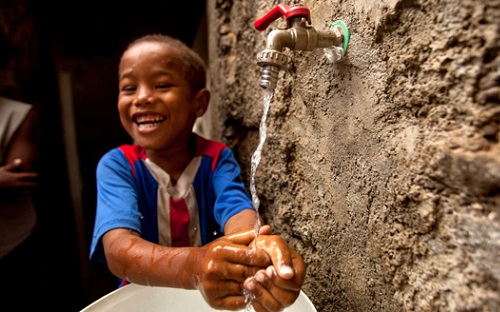At its quarterly meeting today, the Millennium Challenge Corporation (MCC) Board of Directors approved a $35 million threshold program with the Togolese Republic, though the Board directed MCC to continue to closely monitor citizens’ rights to freedom of expression and association, and due process in light of recent events in Togo. The Threshold Program is MCC’s smaller grant program, allowing MCC to reach countries that may not meet the agency’s strict eligibility criteria by engaging with these countries on policy and institutional reforms that support growth, private sector investment, and good governance.
“I am pleased to announce the MCC Board of Directors’ approval of the Togo Threshold Program,” said MCC Acting CEO Jonathan Nash. “This innovative program places Togo’s citizens and the private sector at the heart of Togo’s growth strategy, expanding access to the internet and communications technology, especially for underserved areas, women and youth, as well as clarifying land rights. Investments in these areas are critical to supporting democracy in the country, and spurring economic growth to reduce poverty for the benefit of the people of Togo. This is particularly important in light of recent events in Togo, and MCC will continue to monitor civil liberties and citizens’ rights to freedom of expression in the country as the program moves forward.”
MCC’s Togo Threshold Program will support policy and institutional reforms in two areas identified as critical constraints to economic growth and poverty reduction: information and communication technology (ICT) and land tenure. The program is expected to begin later this year.
In the ICT sector, the program is designed to improve citizens’ access to high quality and affordable ICT services by encouraging private sector investments, developing an independent regulatory regime, expanding service to underserved areas, and increasing use of ICT. To address the land tenure constraint, the program will seek to provide citizens with greater opportunities to obtain formal land rights, starting in five pilot areas across the country. It will also seek to develop a regulatory framework to implement the new land code currently in parliament. The program incorporates stringent accountability mechanisms to ensure that MCC funds are tied to results and are used only for programmatic purposes.
While considering the Togo Threshold Program, the Board noted the concerning events of late 2017 related to the government’s response to protests over democratic rights. While encouraged by more recent remedial actions taken by the government to restore the protection of civil liberties, the Board directed MCC to continue to closely monitor Togo’s commitment to the MCC eligibility criteria. MCC expects all of its country partners to remain committed to democratic governance, which includes guarantees of freedom of expression, the rule of law, and open political participation for all.
More from the April Board of Directors Meeting
In addition to approving the Togo Threshold Program, the Board discussed the successful close out of MCC’s Cabo Verde Compact – MCC’s second compact partnership with Cabo Verde. This included a review of the compact’s accomplishments and early results, as well as an update on the sustainability of MCC’s investments.
Recognizing that Cabo Verde’s economic development was threatened by severe water scarcity and uncertainty about land rights, the $66 million MCC investment enabled the Government of Cabo Verde to reform its land and water sectors, establishing a foundation of policies, institutions, and infrastructure on which Cabo Verdeans can build a more prosperous future.
As a country strategically located at the crossroads of mid-Atlantic air and sea routes, the U.S. works with Cabo Verde not only on maritime trade but also on security. Cabo Verde is an important U.S. partner in advancing stability and development in West Africa.
MCC investments helped the Government of Cabo Verde establish a single source of land rights and boundaries information on four high-tourism islands, facilitating private investment across the islands and improving the time it takes to transfer land titles from 72 days or more to 3 days or less.
The MCC investment also established accountable institutions to deliver higher-quality water and sanitation services to households and businesses, doubling the average hours per day that water service is available from 6 hours to 14.6 hours. Average water consumption also nearly doubled, from 20 liters per capita per day to 35 liters per capital per day, demonstrating that water service is improving and households are utilizing it. On the Cabo Verdian island ofMaio, average water consumption went from an average of 8 hours per day with occasional multiday outages to safe and reliable water 24 hours a day, 7 days per week.
MCC’s grant investments help people lift themselves out of poverty, creating more stable, secure countries with new business opportunities abroad. MCC employs a transparent competitive selection process and targets conditions that hold nations back from economic growth and progress. The agency takes a business-like approach, with bedrock commitments to data, accountability and evidence-based decisions.
Source : www.icilome.com
